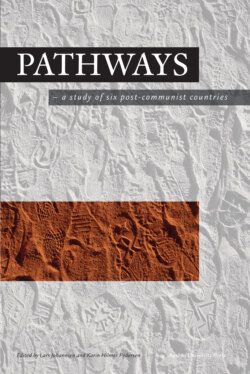Читать книгу Pathways - Группа авторов - Страница 9
На сайте Литреса книга снята с продажи.
Redistributing ownership
ОглавлениеThe economic structure under communism was based on state ownership and planning, according the communist elite nearly absolute power and control over economic decisions. Thus, the political system could not have been transformed without rearranging the economic institutions and redefining the relationship between political and economic power (Elster, Offe, & Preuss 1998). Rejection of the communist tradition of state-owned means of production and centralised economic planning obviously required a revision of property rights, implying privatisation and marketisation in the form of price liberalisation and exposure of domestic markets to global competition (Frydman et al. 1993). Choices in these areas determined who stood to gain and who to lose in the process.
Two approaches soon crystallised – radical ‘big bang’ versus gradual reform (Przeworski 1991; Williamson 1993), anticipating that economic hardship and unemployment would be inescapable consequences of reform. The two approaches primarily diverged in their estimation of how severe the crisis would be and how long it would take the economies to recover. Inspired by the neo-liberal so-called Washington consensus, the radical ‘big bang’ was thought to bring about a steep J-curve with initial contraction being followed by speedy recovery (Hellman 1998). Conversely, the gradual reform process was expected to produce a less steep J-curve and require a more prolonged period of economic recovery. Marketisation appears to have had its own set of political consequences for the functioning of democracy. Advocates of rapid economic reform claimed that, given the expected initial welfare loss (Fidrmuc 2003), the elite should utilise the ‘extraordinary political capital’ generated by the systemic change to implement policies and then see them through before electoral reaction set in (Balcerowicz 1994). However, such a top-down reform process constricts democracy and might well fuel anti-democratic and populist tendencies (Grabel 2000; Przeworski et al. 1995).
The initial choices of pace and sequencing of economic reform policies diverged radically among the countries. Estonia made the most radical and consistent choices in terms of price liberalisation, free trade policies, introduction of a flat tax rate system and large-scale privatisation (Nørgaard & Johannsen, 1999). The early stages of Poland’s liberalisation in 1989-1991 were equally successful, utilising a strongly autocratic, autonomous ‘change team’ with a high degree of internal coherence that was relatively insulated from social actors and commanded extensive foreign expertise (Pedersen & Zubek, 2005). However, problems of how to privatise major state-owned enterprises are still pending, in part due to comparatively high levels of employee security and influence. Largely following neo-liberal recommendations, Prime Minister Vasclav Klaus introduced a voucher scheme for the Czech privatisation process, giving every adult Czech person a share of state property. With respect to economic liberalisation, Kazakhstan is in a completely different league as access to natural resources (oil) creates special conditions for the extraordinary extraction of windfall resources by the elites, which leads to discussions of ‘rentier states’ (e.g. Ross 2001). To some extent the same is true of Georgia, which controls Russian gas pipelines. However, ethnic conflict and chaos have derailed the successful strategic use of the resources.
The privatisation process has given the incumbent elites vast opportunities to strengthen their power bases in the economic sphere. Adjectives characterising the process more as theft than fair trade have been common. Moreover, in Poland unsettled issues of privatisation have enabled the elite to shift smoothly between political positions in parliament and private entrepreneurships, contributing to a general mistrust in elite behaviour and raising suspicions and accusations of corruption.
